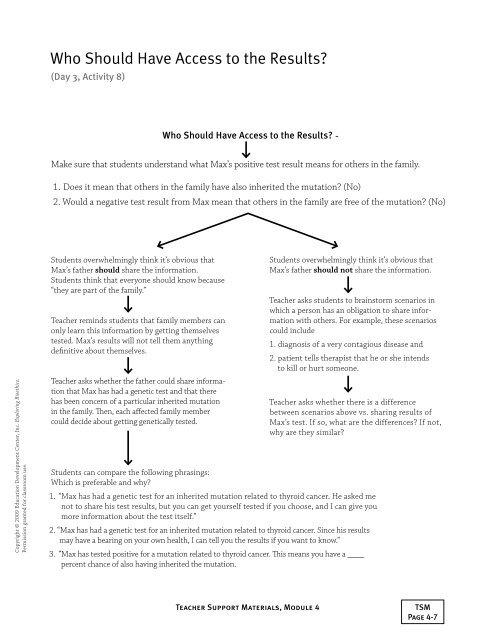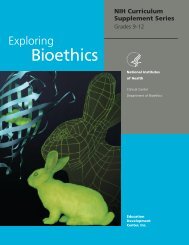Complete Module 4 Teacher Support Materials - NIH Office of ...
Complete Module 4 Teacher Support Materials - NIH Office of ...
Complete Module 4 Teacher Support Materials - NIH Office of ...
You also want an ePaper? Increase the reach of your titles
YUMPU automatically turns print PDFs into web optimized ePapers that Google loves.
Who Should Have Access to the Results?(Day 3, Activity 8)Who Should Have Access to the Results?Make sure that students understand what Max’s positive test result means for others in the family.1. Does it mean that others in the family have also inherited the mutation? (No)2. Would a negative test result from Max mean that others in the family are free <strong>of</strong> the mutation? (No)Copyright © 2009 Education Development Center, Inc. Exploring Bioethics.Permission granted for classroom use.Students overwhelmingly think it’s obvious thatMax’s father should share the information.Students think that everyone should know because“they are part <strong>of</strong> the family.”<strong>Teacher</strong> reminds students that family members canonly learn this information by getting themselvestested. Max’s results will not tell them anythingdefinitive about themselves.<strong>Teacher</strong> asks whether the father could share informationthat Max has had a genetic test and that therehas been concern <strong>of</strong> a particular inherited mutationin the family. Then, each affected family membercould decide about getting genetically tested.Students overwhelmingly think it’s obvious thatMax’s father should not share the information.<strong>Teacher</strong> asks students to brainstorm scenarios inwhich a person has an obligation to share informationwith others. For example, these scenarioscould include1. diagnosis <strong>of</strong> a very contagious disease and2. patient tells therapist that he or she intendsto kill or hurt someone.<strong>Teacher</strong> asks whether there is a differencebetween scenarios above vs. sharing results <strong>of</strong>Max’s test. If so, what are the differences? If not,why are they similar?Students can compare the following phrasings:Which is preferable and why?1. “Max has had a genetic test for an inherited mutation related to thyroid cancer. He asked menot to share his test results, but you can get yourself tested if you choose, and I can give youmore information about the test itself.”2. “Max has had a genetic test for an inherited mutation related to thyroid cancer. Since his resultsmay have a bearing on your own health, I can tell you the results if you want to know.”3. “Max has tested positive for a mutation related to thyroid cancer. This means you have a ____percent chance <strong>of</strong> also having inherited the mutation.<strong>Teacher</strong> <strong>Support</strong> <strong>Materials</strong>, <strong>Module</strong> 4TSMPage 4-7
















